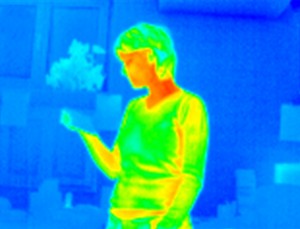 Lie detection equipment in airports is old news, but the use of thermal imaging cameras and powerful software to covertly spot potential deception is not.
Lie detection equipment in airports is old news, but the use of thermal imaging cameras and powerful software to covertly spot potential deception is not.
An undisclosed airport in Britain is implementing this new technology that keeps an unwitting eye on people entering the country by scanning passengers for signs of truthfulness.
Mail Online News has reported on Britain’s new security defense. This covert operation, if you will, could be used at passport control stations and in customs interview rooms. The “new” deception detection tool has a greater advantage than the current tools such as electronic body scanners and metal detectors because it is being implemented without the knowledge of the person in question.
This device reads tiny changes in facial expressions such as eye movement and micro facial expressions that have corresponding reactions in the brain, which cause changes in the patterns of blood flow around the face. The changes in blood flow to the face are picked up by thermal imaging cameras. These “truthfulness” measurements can prove to be useful not only in airports but in a variety of places such as schools and business conferences.
The system’s designer Hassan Ugail, a professor of visual computing at the University of Bradford, commented on this software, ‘In an interview you can be talking to a person, then you basically just press a computer button and say: “Was this person lying or not?”’
Detecting deception with just a click of the button can be misleading. What do you think about this type of software? Do “real” people also need to be trained to understand the nuances of human behavior for this to be a double edged sword for criminals?
Professor Ugail goes on to state, “What we try to do is experiment with the face itself, but it is purely non-invasive, which means the person is probably not aware the measurements are being taken.”
This system is still being developed but Ugail and his colleagues have claimed a 60-70 percent success rate.
What are your thoughts on this non-invasive lie detection technology?
To me it seems like this thermal imaging, pretty much, will face the same problem as the polygraph. Even the reported accuracy of this system is equivalent to the polygraph.
The problem, as with the polygraph, is that even though the person is unaware of the thermal imaging cameras, the situation of an interrogation or being suspected of something or just a normal interview might cause a bodily reaction that might be seen as deceptive when its just the situation it self.
It does not seem like its an improvement in lie detection technology. Just that it might be a better alternative to the polygraph because its non-invasive. I still think “real” people need to be trained.
Hassan Ugail comes across as a bit biased and/or blinded by his own study when is he says “you basically just press a computer button and say: “Was this person lying or not?”. That, in, my ears is just asking for all kinds of trouble and misstakes by putting that much confidence in any kind of technology that is suppose to measuring human behaviour.
Markus – You make very valid points such as a possible false positive if a person is shy or not used to being asked questions.
It seems that any type of protective/preventive security system would be much improved with a back-up system (person/technology) in place that could reinforce a true positive. Two “minds” if you will are always better than one.
In reality, deception technology like this can be extremely useful in a lot of situations, however if people are basing deception exclusively off this, I think that’s where the problem starts to arise. Like Markus said, just being suspected and asked questions can indeed give an illusion of deception. I think one way to really use this technology to its full benefit, is to ask the suspect or whoever is being interviewed questions that you already know the answer to. So that way if it does indeed come up as a false positive, you will know that the person is just simply nervous or highly anxious while answering. If that is the case, you could attempt to calm that person down a bit and then ease into asking the necessary questions to detect truthfulness.